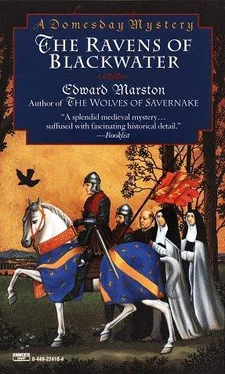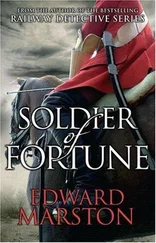Edward Marston - Ravens Of Blackwater
Здесь есть возможность читать онлайн «Edward Marston - Ravens Of Blackwater» весь текст электронной книги совершенно бесплатно (целиком полную версию без сокращений). В некоторых случаях можно слушать аудио, скачать через торрент в формате fb2 и присутствует краткое содержание. Год выпуска: 0101, Жанр: Исторический детектив, на английском языке. Описание произведения, (предисловие) а так же отзывы посетителей доступны на портале библиотеки ЛибКат.
- Название:Ravens Of Blackwater
- Автор:
- Жанр:
- Год:0101
- ISBN:нет данных
- Рейтинг книги:4 / 5. Голосов: 1
-
Избранное:Добавить в избранное
- Отзывы:
-
Ваша оценка:
- 80
- 1
- 2
- 3
- 4
- 5
Ravens Of Blackwater: краткое содержание, описание и аннотация
Предлагаем к чтению аннотацию, описание, краткое содержание или предисловие (зависит от того, что написал сам автор книги «Ravens Of Blackwater»). Если вы не нашли необходимую информацию о книге — напишите в комментариях, мы постараемся отыскать её.
Ravens Of Blackwater — читать онлайн бесплатно полную книгу (весь текст) целиком
Ниже представлен текст книги, разбитый по страницам. Система сохранения места последней прочитанной страницы, позволяет с удобством читать онлайн бесплатно книгу «Ravens Of Blackwater», без необходимости каждый раз заново искать на чём Вы остановились. Поставьте закладку, и сможете в любой момент перейти на страницу, на которой закончили чтение.
Интервал:
Закладка:
Ralph Delchard had never heard of Chapter Forty-eight of the Rule of St. Benedict and he would have been astounded to learn that one of his own beliefs had monastic authority, but he was convinced that idleness was bad for the body and soul of his knights. It was important to keep them alert and well disciplined at all times. If the threatened invasion of the Danes had, in fact, taken place, Ralph would have been called to lead his knights into battle and their military worth would have been put to the test. He was determined that his men would not be found wanting in any emergency. Ralph had planned to take them on an invigorating gallop before putting them through some training exercises with sword and lance. Gilbert Champeney’s invitation to go hawking was thus particularly welcome because it enabled Ralph to combine a ride with his men and an hour’s sport.
“What have we caught so far?” he asked.
“Duck, pigeon, and pheasant,” said Gilbert, glancing at the game bag, which his servant carried. “They will make fine dishes during your stay with us. Canon Hubert tells me he is partial to hare as well.”
“Hubert will eat anything that moves,” said Ralph. “My cook has a magical touch with hares.”
“I prefer rabbit. I wish King William would bring more of them over
from Normandy. They breed well and are easier to catch.” Ralph winked at him. “Hubert gobbled them up by the dozen when he was serving the Lord in Bec.”
“We must keep the Church happy.”
They had ridden a few miles from the manor house and were on the edge of a small wood. Miles Champeney had joined them and his falcon was the most deadly of all the hunting birds. Ralph watched the young man as he un-hooded the creature yet again and flicked his arm so that the falcon left its leather perch and shot into the sky. It did not need to fly very far. Hovering above a clearing in the wood, it saw something that sharpened its instinct and concentrated all its fierce attention. The steady beat of its wings suddenly changed, its neck stretched forward, and it hurtled towards the ground with fran-tic speed. Through a cluster of trees, Ralph was just able to pick out a glimpse of its quarry as talons of steel sank into frenzied fur.
“I think you may have found your hare, Gilbert.” “Give the credit to my son.”
“He has a rare talent for hawking.”
“Hawking, hunting, and chasing women.” Ralph sighed with nostalgia. “The bounty of youth!”
“And the consolation of old age.”
Ralph chortled in appreciation. When the sport was over, the hunting party set off in the direction of Champeney Hall with a full game bag. Partridge and squirrel had also been killed, although the latter was discarded as unsuitable for the larder. Under their captain, the seven knights rode off hard and left the rest of the company to return at a more sedate pace. Ralph rode between father and son. Gervase had told him what he had learned about Miles Champeney and his friend was fascinated to know more. He tried to disguise his enquiries behind a chuckling jocularity.
“You are a true falconer, Miles,” he observed. “I like the sport.”
“Every man should have a hawk and hounds,” said Ralph. “If I were
back on my estate in Hampshire, I would be out hunting right now. The King’s business has robbed me of that delight. I am grateful that I have been able to snatch this hour of pleasure with you and your father.”
“We mean to make you enjoy your stay,” said the genial Gilbert. “Is that not so, Miles?”
“Yes, Father.”
“Guests from the King are always welcome.”
“We have been blessed by our host,” said Ralph. “You keep a splendid house, Gilbert, and you know how to take the most out of this life of ours.”
“I love Maldon. It is the next best thing to Heaven.” “Your son may not agree.”
“Why?” asked Miles.
“Because the town has less to offer a sprightly young man like yourself,” said Ralph. “Maldon is full of Saxon women and celibate nuns. They are like the squirrel that your falcon caught-pretty to look at but hardly fit for the larder. How can you practise the arts of dalliance without a supply of fair maids?”
“We do not lack beautiful women, my lord,” said Miles with a defensive note. “They are here in plenty.”
“I have not seen them,” said Ralph. “They must be hiding behind
their doors in the town or behind their veils at the priory.” He paused for a moment then gave his companion a knowing nudge. “But you are right, Miles. There must be some ladies hereabouts who can make a man’s blood race. He found them, after all.”
“He?”
“Guy FitzCorbucion.” “Why do you say that?”
“Because it is what everybody else says,” explained Ralph. “Your
father among them. Guy was a ladies’ man. He had a reputation for liberality and spread his love around.”
“Guy was as lecherous as a monkey,” agreed Gilbert.
“Then the town must be full of lovely ladies. Unless he was the kind of man to take his pleasures with servant-girls and other poor wretches who were afraid to disobey him.” He looked across at Miles. “What do you think? I know we should not speak ill of the dead but then I do not hold carnal desire to be a sin, so it is no stain on his character. What was Guy really like, Miles?”
“You must ask of others, my lord.”
“But I am told you knew him well.” “Too well.”
Miles Champeney gave a nod of farewell then nudged his horse into a trot until he caught up to the servant who was carrying the wooden pole on which all of the hawks were perched and tethered. Ralph was disappointed. He had learned no more from him than Gervase. As before, it was Gilbert who tried to account for his son’s behaviour.
“It is a difficult time for Miles,” he explained. “He is not usually as
uncivil as this. There is much on his mind and it has made him withdraw into himself. Guy’s murder was bound to cause him anxiety.”
“Anxiety?”
“Yes, Ralph. He may be called to give evidence.” “Called? By whom?”
“The sheriff and his officers.”
“But Miles is not involved in the killing.” “They will want to make sure of that.”
“The murderer has already been named,” said Ralph. “A boy called Wistan whose father was struck down by Guy. They are combing the area now for the lad.”
“Yes,” said Gilbert, “and if they catch him and get a confession out of him, nobody will be more relieved than Miles. But I am not at all sure that this Wistan is the culprit. How could he get close enough to Guy to perpetrate such a foul crime? And what could a boy do against a man who was bigger, stronger, and properly armed?”
“Oslac the Priest thinks that Wistan is innocent.” “I agree with Oslac.”
“Then let us assume he is right.” “If the boy did not do the deed …” “Someone else did.”
“In which case, they will need to question Miles.”
“But why?” said Ralph. “Your son is no killer. Why on earth should the sheriff wish to bother him in any way?”
“Because of a certain incident.”
“Yes. Gervase told me about the fight.” “Did he tell you what caused it?”
“What often causes fights between young men,” said Ralph with
easy cynicism. “A young woman.” “Guy’s sister. Matilda.”
“Your son wishes to marry her.” “Madness!”
“And Matilda seems to requite his love.” “Chaos! It breaks my old heart, Ralph.”
“But you have still not told me why the sheriff and his officers may come looking for Miles. What has he done?”
“When they came to blows,” explained Gilbert, “there were witnesses. They heard what Guy said and they will be duty bound to
Читать дальшеИнтервал:
Закладка:
Похожие книги на «Ravens Of Blackwater»
Представляем Вашему вниманию похожие книги на «Ravens Of Blackwater» списком для выбора. Мы отобрали схожую по названию и смыслу литературу в надежде предоставить читателям больше вариантов отыскать новые, интересные, ещё непрочитанные произведения.
Обсуждение, отзывы о книге «Ravens Of Blackwater» и просто собственные мнения читателей. Оставьте ваши комментарии, напишите, что Вы думаете о произведении, его смысле или главных героях. Укажите что конкретно понравилось, а что нет, и почему Вы так считаете.












